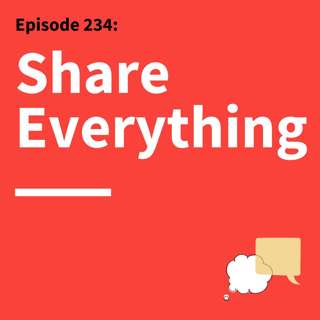
44. Act Like a Leader: How Lessons From The Theater Can Help You Step into Power
"Leadership is a role that you play, like a part you play in other people’s lives. And [your] expression of that role is your responsibility as a leader,” says Stanford GSB lecturer Melissa Jones Briggs. Jones Briggs’ work combines techniques from the theater with social science research to teach lessons about power and communication. In this conversation with host Matt Abrahams, she discusses how acting in a leadership position requires staying present and also knowing when to step back. “Power and authority often determine which stories are centered and which stories are marginalized,” Jones Briggs says. “By uncovering previously untold stories, we can create environments that invite new stories in, and that helps shape inclusive and equitable work cultures.”Connect:Premium Signup >>>> Think Fast Talk Smart PremiumEmail Questions & Feedback >>> hello@fastersmarter.ioEpisode Transcripts >>> Think Fast Talk Smart WebsiteNewsletter Signup + English Language Learning >>> FasterSmarter.ioThink Fast Talk Smart >>> LinkedIn, Instagram, YouTubeMatt Abrahams >>> LinkedIn ********Thank you to our sponsors. These partnerships support the ongoing production of the podcast, allowing us to bring it to you at no cost.Strawberry.me. Get $50 off coaching today at Strawberry.me/smartBecome a Faster Smarter Supporter by joining TFTS Premium.
11 Nov 202121min

43. Get Psyched: How Time and Situations Shape Our Communication
“Social psychologists believe that if we want to understand our own behavior and the behavior of others, the first thing we have to ask or notice is, ‘What is the situation in which they are performing, in which they are behaving?’ And then we want to know as much about the situation as possible.”In this episode of Think Fast, Talk Smart, Stanford emeritus psychology professor Phillip Zimbardo sits down with host Matt Abrahams to discuss how time influences our perception and our positive or negative thought processes. The two also talk about how the findings of Zimbardo’s most notable (and controversial) study — the 1971 Stanford Prison Experiment — inform our understanding of human behavior. Connect:Premium Signup >>>> Think Fast Talk Smart PremiumEmail Questions & Feedback >>> hello@fastersmarter.ioEpisode Transcripts >>> Think Fast Talk Smart WebsiteNewsletter Signup + English Language Learning >>> FasterSmarter.ioThink Fast Talk Smart >>> LinkedIn, Instagram, YouTubeMatt Abrahams >>> LinkedIn ********Thank you to our sponsors. These partnerships support the ongoing production of the podcast, allowing us to bring it to you at no cost.Strawberry.me. Get $50 off coaching today at Strawberry.me/smartBecome a Faster Smarter Supporter by joining TFTS Premium.
28 Okt 202120min

42. Space, Pace, and Grace: How to Handle Challenging Conversations
Being a better listener has a lot to do with silence, says Collins Dobbs, a lecturer in management at Stanford Graduate School of Business. “A lot of people are uncomfortable with the smallest modicum of silence, but learning often happens when we create distance for useful reflection.”In this episode of Think Fast, Talk Smart, Dobbs talks with host Matt Abrahams about the importance of “space, pace, and grace” when you’re receiving others’ feedback and handling the emotions that come out during tough discussions. “There’s often a lot more focus on the skill set on delivering emotion than receiving emotion, but if the receiver of emotion can put themselves in a place of curiosity, agency, and openness. . . . opens up a whole new world of possibilities.” Dobbs is an executive coach and teaches several courses, including Interpersonal Dynamics, and Leadership Labs. Connect:Premium Signup >>>> Think Fast Talk Smart PremiumEmail Questions & Feedback >>> hello@fastersmarter.ioEpisode Transcripts >>> Think Fast Talk Smart WebsiteNewsletter Signup + English Language Learning >>> FasterSmarter.ioThink Fast Talk Smart >>> LinkedIn, Instagram, YouTubeMatt Abrahams >>> LinkedIn ********Thank you to our sponsors. These partnerships support the ongoing production of the podcast, allowing us to bring it to you at no cost.Strawberry.me. Get $50 off coaching today at Strawberry.me/smartBecome a Faster Smarter Supporter by joining TFTS Premium.
15 Okt 202125min

41. Speak like a Founder: How Successful Entrepreneurs Communicate to Their Teams
“Part of teamwork is dating,” says Stefanos Zenios, The Investment Group of Santa Barbara Professor of Entrepreneurship and Professor of Operations, Information & Technology. “Dating each other to see whether you can work well together. It’s about developing how you will speak with each other in the team, how you will manage difficult conversations, and how to be respectful, but also how to help each other grow.” In this episode of Think Fast, Talk Smart, host Matt Abrahams sits down with Professor Zenios to hear more about the methods shared in the Stanford GSB project-based course Startup Garage. Connect:Premium Signup >>>> Think Fast Talk Smart PremiumEmail Questions & Feedback >>> hello@fastersmarter.ioEpisode Transcripts >>> Think Fast Talk Smart WebsiteNewsletter Signup + English Language Learning >>> FasterSmarter.ioThink Fast Talk Smart >>> LinkedIn, Instagram, YouTubeMatt Abrahams >>> LinkedIn ********Thank you to our sponsors. These partnerships support the ongoing production of the podcast, allowing us to bring it to you at no cost.Strawberry.me. Get $50 off coaching today at Strawberry.me/smartBecome a Faster Smarter Supporter by joining TFTS Premium.
30 Sep 202120min
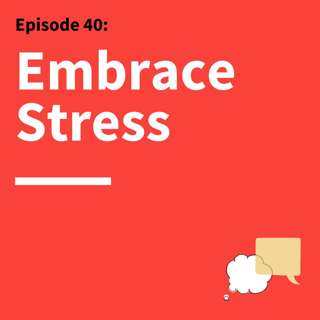
40. Mindset Matters: How to Embrace the Benefits of Stress
“Stress is natural, stress is inevitable when you're living a life that's connected with things you care about. And learning how to embrace it, learning how to work with it is really what helps us thrive and grow and perform at our highest level, according to psychologist and associate professor at Stanford, Alia Crum. In this episode, Crum talks with host and lecturer Matt Abrahams about her research and findings as principal investigator of the Stanford Mind and Body Lab where she is focusing on reshaping our mindset to embrace stress. “There's a whole side of stress that shows that it can have enhancing qualities on our cognitive functioning, our physical health and on how we behave and interact with others,” she says.Connect:Premium Signup >>>> Think Fast Talk Smart PremiumEmail Questions & Feedback >>> hello@fastersmarter.ioEpisode Transcripts >>> Think Fast Talk Smart WebsiteNewsletter Signup + English Language Learning >>> FasterSmarter.ioThink Fast Talk Smart >>> LinkedIn, Instagram, YouTubeMatt Abrahams >>> LinkedIn ********Thank you to our sponsors. These partnerships support the ongoing production of the podcast, allowing us to bring it to you at no cost.Strawberry.me. Get $50 off coaching today at Strawberry.me/smartBecome a Faster Smarter Supporter by joining TFTS Premium.
16 Sep 202126min
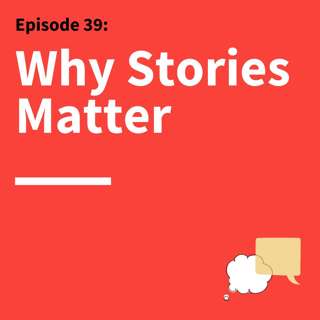
39. Brains Love Stories: How Leveraging Neuroscience Can Capture People's Emotions
In this episode of Think Fast, Talk Smart, lecturer and podcast host Matt Abrahams sits down with David Eagleman, a neuroscientist and the host of the PBS series The Brain, to discuss why our brains are wired for storytelling and how new senses might impact our connection and communication with others. “I’ve always been really interested in this idea of how we can pass information to the brain via unusual channels," Eagleman says. "We’ve got our eyes or ears or fingertips and our nose, we’re very used to this and we sort of think these are fundamental, but of course, this is just what we’ve inherited from a long road of evolution... It turns out you can push information in the brain in other ways.”Connect:Premium Signup >>>> Think Fast Talk Smart PremiumEmail Questions & Feedback >>> hello@fastersmarter.ioEpisode Transcripts >>> Think Fast Talk Smart WebsiteNewsletter Signup + English Language Learning >>> FasterSmarter.ioThink Fast Talk Smart >>> LinkedIn, Instagram, YouTubeMatt Abrahams >>> LinkedIn ********Thank you to our sponsors. These partnerships support the ongoing production of the podcast, allowing us to bring it to you at no cost.Strawberry.me. Get $50 off coaching today at Strawberry.me/smartBecome a Faster Smarter Supporter by joining TFTS Premium.
2 Sep 202122min
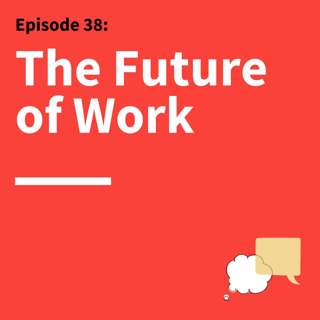
38. The New Normal: How Hybrid Work Actually Works
“One of the things I think is really exciting about all this, and perhaps a little bit frightening, is nobody actually knows how to do it. It is not something that we’ve ever done before. And I’ve studied a lot of globally distributed work, and virtual teams, and so forth. But hybrid work is not that and it’s not telecommuting, which we know a bit about. But it’s something that is a mix of these multiple different modes of working,” says Pamela Hinds, Fortinet Founders Chair and professor of management science and engineering at Stanford University.In this episode, Hinds talks with host and lecturer Matt Abrahams about her research on the effect of technology on teams, teamwork, and innovation by exploring issues of culture, language, identity, and conflict in promoting knowledge sharing and collaboration. “Employees are going to expect flexibility. Organizations are going to need to sustain a higher level of flexibility with regard to when and where people work.” Connect:Premium Signup >>>> Think Fast Talk Smart PremiumEmail Questions & Feedback >>> hello@fastersmarter.ioEpisode Transcripts >>> Think Fast Talk Smart WebsiteNewsletter Signup + English Language Learning >>> FasterSmarter.ioThink Fast Talk Smart >>> LinkedIn, Instagram, YouTubeMatt Abrahams >>> LinkedIn ********Thank you to our sponsors. These partnerships support the ongoing production of the podcast, allowing us to bring it to you at no cost.Strawberry.me. Get $50 off coaching today at Strawberry.me/smartBecome a Faster Smarter Supporter by joining TFTS Premium.
19 Aug 202121min
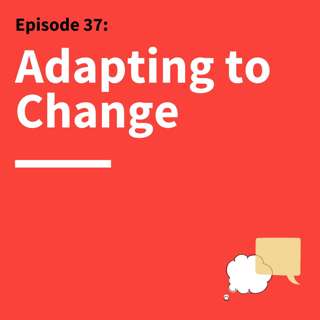
37. Be Better: How Communication Catalyzes Business Transformation
In this episode of Think Fast, Talk Smart, Stanford GSB Lecturer Robert Siegel sits down with Matt Abrahams to discuss the role of communication in helping businesses to adapt and transform and his new book The Brains and Brawn Company: How Leading Organizations Blend the Best of Digital and Physical Specifically. “You have to see how things are interacting with each other. You have to see how your organization is interacting both internally and externally. And so what we found is that great systems leaders were really good at managing the narrative,” says Siegel.Connect:Premium Signup >>>> Think Fast Talk Smart PremiumEmail Questions & Feedback >>> hello@fastersmarter.ioEpisode Transcripts >>> Think Fast Talk Smart WebsiteNewsletter Signup + English Language Learning >>> FasterSmarter.ioThink Fast Talk Smart >>> LinkedIn, Instagram, YouTubeMatt Abrahams >>> LinkedIn ********Thank you to our sponsors. These partnerships support the ongoing production of the podcast, allowing us to bring it to you at no cost.Strawberry.me. Get $50 off coaching today at Strawberry.me/smartBecome a Faster Smarter Supporter by joining TFTS Premium.
5 Aug 202124min
